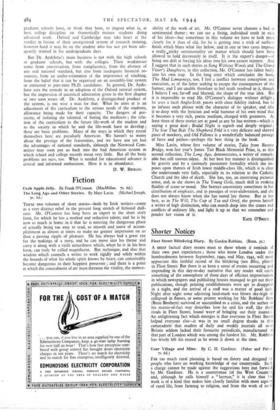Fiction
Crab Apple Jelly. By Frank O'Connor. (MacMillan. 7s. 6d.) The Long Ago and Other Stories. By Mary Lavin. (Michael Joseph. 9s. 6d.)
THESE tWO volumes of short stories—both by Irish writers—come as a very distinct relief in the present long stretch of fictional dull- ness. Mr. O'Connor has long been an expert in the short story form, for which he has a marked and seductive talent; and he is by now so much at home in it that he is entering the dangerous phase of actually being too easy to read, so smooth and suave of accom- plishment as almost at times to make no greater impression on us than a passing ripple of pleasure. He has always had a great eye for the makings of a story, and he can move into his theme and carry it along with a virile naturalness which, when he is in his best form, can truly be called magnificent. But technique, and also that wisdom which counsels a writer to work rigidly and solely within the bounds of what his whole spirit knows by heart, can conceivably become dangerous to their happiest possessor ; and there is a point at which the concealment of art must threaten the vitality, the memor- ability of the work of art. Mr. O'Connor never chooses a bad or sentimental theme ; we can see a living, individual truth in each of his ideas—but sometimes in this volume we have to look more closely for it than of old, for he is getting into a trick of surface- finish which blurs what lies below, and in one or two cases impose, a really.iticky sentimentality on matter which should have been allowed to hold decorously to itself. It is the expert's danger—of being too deft at forcing his ideas into his own easiest manner. And I suggest that in such stories as Song Without Words and The Grand Vizier's Daughters, in this collection, Mr. O'Connor has fallen badly into his own trap. In the long story which concludes the book, The Mad Lomasneys, too, I feel a conflict between conception and execution, as of the latter seeking to escape the consequences of the former, and I am unable therefore to feel truth resolved in it, though I believe I see, far-off and blurred, the shape of the true idea. But it is impossible to read Mr. O'Connor's dialogue without delight ; he uses a local Anglo-Irish patois with close fidelity indeed, but he so infuses each phrase with the character of its speaker, and rifts it so deep with the lyricism and wild humour of his own mind that it becomes a very rich, poetic medium, charged with greatness. At least three of these stories are as good as any he. has written—which is saying a great deal ; Bridal Night is superb and deeply original ; The Star That Bids The Shepherd Fold is a very delicate and shrewd piece of mockery, and Old Fellows is a wonderfully balanced passage of farce and pathos—perhaps the best thing in the book.
Miss Lavin, whose first volume of stories, Tales from Bective Bridge, won last year's James Tait Black Memorial Prize, is, as this second collection, The Long Ago, demonstrates, a writer of remark- able but still uneven talent. At her best her manner is distinguished by gravity and by a curiously passionate formality which she im- poses upon themes of Irish lower middle-class life, which it is clear she understands very fully, especially in its relation to the Catholic Church and the idea of death. She has, too, an interesting pictorial sense, and, as she shows in The Young Girls, much skill in evoking fluidity of scene or mood. She betrays uncertainty sometimes in her distribution of emphasis, and in passages of over-elaboration, and she does not always know when she has stated her theme. But at her best, as in The Will, The Cup of Tea and Grief, she proves herself a writer of high distinction, who can search deep into the crazes and conflicts of ordinary life, and light it up so that we remember and ponder her vision of it.
KATE O'BRIEN.


























 Previous page
Previous page